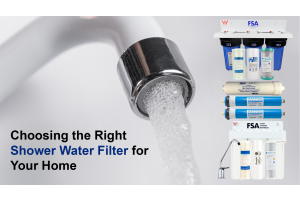

“Should fluoride be added to or removed from tap water?”. We often get to hear this question at Filter Systems Australia probably more than any other question on tap water treatment or quality.
It is commonly said and known that chemicals like lead and arsenic can cause harm to your health. In fact, consuming water that contains high levels of these chemicals can increase the risk of cancer, skin lesions and brain damage. But have you ever wondered about all the positive and negative attention fluoride is getting these days as a chemical ingredient in drinking water?
While fluoride has been added to water for decades, the debate on the presence of this chemical in water has been raging for some time now. Some water supply authorities, dentists and public health officials suggest adding fluoride to water for its clear benefits, like strengthening tooth enamel and reducing risk of tooth decay, while others believe that it could cause more harm than good.
Many studies have consistently shown that having fluoridated water is quite beneficial. In 2017, the National Health and Medical Research Council released a public statement that, “there is no reliable evidence that water fluoridation at current Australian levels causes health problems”. However, there are still opponents of water fluoridation who question its safety and effectiveness from time to time.
At Filter Systems Australia, we do not intend to change anyone’s opinion or take sides in this matter, but we simply want to share with you all the information we have regarding the same so that you can be in the know and make informed decisions in future.
A Brief on Fluoride
Fluoride is a mineral that occurs naturally in water sources, many foods, soil and rocks and is derived from fluorine – a common element in the Earth’s crust. Fluoride is commonly known and used in dentistry for strengthening enamel and prevent or reverse early signs of tooth decay. It is also added to public water supply in Australia and many other countries. So, if you brush your teeth twice a day with a fluoride toothpaste and then drink an adequate amount of water that contains safe levels of fluoride, you are giving yourself best possible chance of having healthy and strong teeth.
What’s so good about fluoride in water supply?
Water fluoridation has been practised for several decades as a safe and effective way to reduce the risk of dental cavities. While poor or improper brushing regimen, sugary drinks and too much snacking largely contribute to dental issues, drinking fluoride-free bottled water has also been linked to most of the children in Australia suffering from tooth decay by age six. No matter how convenient it is to consume bottled water, no parents would want to put their kids at the risk of poor dental health for the sake of convenience. And that’s one reason why we recommend installing a water filter system at your home. Not only does it provide you with easy and quick access to clean and safe drinking water, but it also eliminates the hassle and costs involved in buying bottled water. Moreover, it’s not just children that can benefit from water that contains fluoride. Once you have your adult teeth, it is important to keep them healthy and strong to prevent dental infections and conditions like cavities, gingivitis, bad breath and sensitive teeth. Studies show that fluoride added in municipal water supply prevents at least 25 percent of tooth decay in children as well as adults. There are several scientific evidences that indicate that community water fluoridation is safe and effective.
Besides these dental health benefits, you will be surprised to know that the average lifetime cost per person to fluoridate water is less than the cost of one dental filling. This means having fluoridated water can offer savings and benefits to many people who cannot afford the cost of regular dental checks or dental treatments. So, it is not just safe and effective but also cost-efficient to have fluoride in your water.
Is there any potential risk associated with fluoride?
Water fluoridation or fluoridated water has clear benefits. However, if having some fluoride is good, it does not mean having more of it would be better. As with most vitamin medications or mineral supplements, when consumed in large doses, fluoride can be harmful. Most kids and adults get the right amount of fluoride through a combination of fluoridated water, toothpaste and food. Those who get too much of it, may face any of the following side effects in the long run:
Dental Fluorosis: Exposure to high concentrations of fluoride while your teeth are still developing, can cause mild dental fluorosis. It appears as tiny white spots or streaks in the enamel of the tooth. Apart from the appearance of white spots or some discolouration, dental fluorosis does not cause any harmful symptom or affect the health of your teeth in any other way.
Skeletal Fluorosis: It is similar to dental fluorosis, but it just affects bones instead of teeth. Initial symptoms include mild joint pain and stiffness. Long term exposure to high levels of fluoride can alter bone structure and result in calcification of ligaments. Bones may harden and become more elastic, increasing the risk of fractures. Excessive accumulation of fluoride in bones can cause extreme pain and damage to bones and joints.
Thyroid Problems: In some cases, long-term exposure to higher levels of fluoride can damage the parathyroid gland. This may result in uncontrolled secretion of parathyroid hormones – known as hyperparathyroidism. Resultantly, there may be a reduction of calcium in bones while higher concentrations of calcium in the blood.
Apart from these issues, some organisations have linked intake of fluoride in higher concentrations with fluoride poisoning which shows symptoms like abdominal pain, nausea, excessive saliva, seizures and muscle spasms.
THE TAKEAWAY
Fluoride occurs naturally in many foods, like cherries and avocados, and in dental products like toothpaste, gels & mouthwashes. Many public water supply authorities also add optimal levels of the chemical to water in order to promote dental health. At Filter Systems Australia, we aim to provide you with an inexpensive, effective and convenient way to get clean, healthy and great-tasing water. That’s why we not only offer specialised filter systems, like chloramine filter, that are designed to eliminate certain types of chemicals, but also offer filter cartridges that filter out contaminants while letting necessary minerals like fluoride pass through. From RO systems to chloramine removal carbon filters and whole house units, you can choose from a huge variety to suit your household needs and preference.
However, keep in mind that getting too much of fluoride, whether through water or other products, for a prolonged period can result in some side effects. If you are already concerned about your fluoride intake, ask your local government about the levels of fluoride in the public water supply of your area before investing in any water treatment solution.



